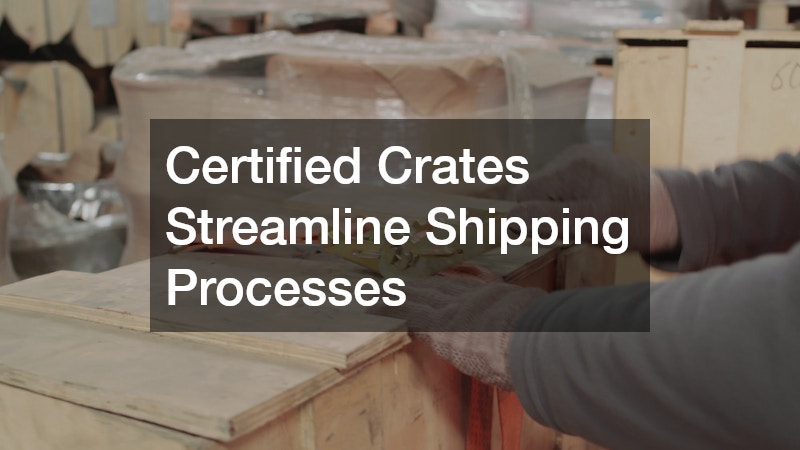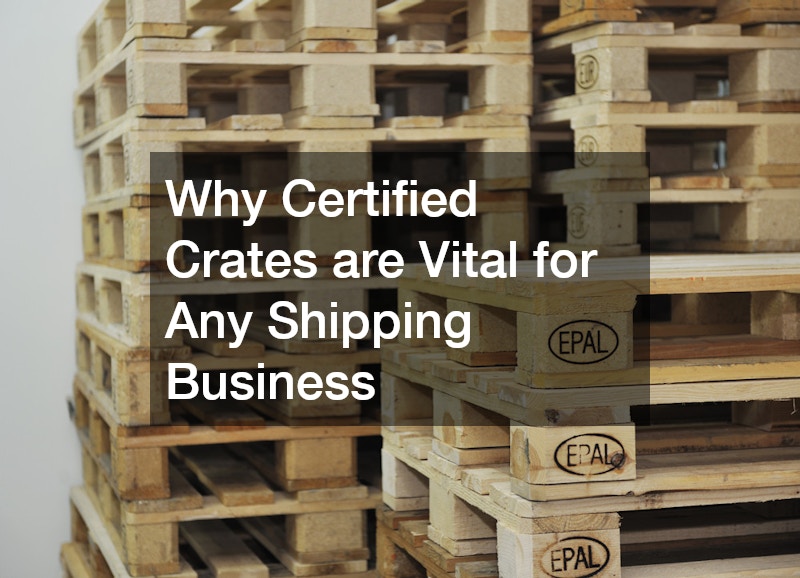Shipping goods efficiently and safely is a cornerstone of any successful logistics operation. Businesses that handle physical products must account for the risks associated with transportation, from handling errors to environmental factors like moisture and temperature changes. One of the most effective ways to mitigate these risks is by using certified crates. Certified crates are specially designed containers that meet industry standards for strength, durability, and compliance, ensuring that products arrive at their destination intact and on time.
By investing in certified crates, companies protect their merchandise and reinforce their reputation for reliability and professionalism.
The importance of certified crates becomes even more evident when examining high-value or fragile shipments. These crates are often tested to withstand rigorous handling, stacking, and shipping conditions, which can prevent costly damages. For instance, electronics, medical equipment, and delicate machinery require packaging that conforms to strict industry certifications. Companies that prioritize certified crates reduce their liability and gain the confidence of clients and partners, demonstrating a commitment to quality and safety throughout the supply chain.
Understanding the Role of Certified Crates in Shipping
Certified crates serve as more than just containers; they are an integral part of a company’s logistics strategy. They provide standardized protection for goods during transit, helping businesses maintain consistency in packaging practices while ensuring compliance with industry regulations. Certified crates streamline shipping processes by offering predictable dimensions, stacking capabilities, and handling protocols, reducing errors and delays.
In practical terms, certified crates are essential for businesses that ship internationally or handle sensitive products. For example, companies exporting fragile items like glassware or laboratory instruments rely on certified crates to meet domestic and international shipping requirements. These crates are engineered to endure long journeys, protect against environmental stress, and maintain the integrity of the contents, making them indispensable for businesses focused on reducing damage and maintaining customer trust.
Enhancing Safety Through Certified Crates
Safety is a critical concern in shipping operations, not only for the products being transported but also for the workers handling them. Certified crates are designed to minimize the risk of accidents by offering reinforced construction, secure locking mechanisms, and resistance to crushing or puncturing. By adhering to certified standards, these crates protect the contents and the personnel involved in loading, unloading, and transportation.
A more specific example can be found in industries that ship heavy or hazardous materials. Certified crates are often built with reinforced hardwood, metal framing, or shock-absorbing inserts to prevent accidents during movement. In warehouses and during transit, these features reduce the likelihood of injuries caused by falling or damaged cargo. Companies that use certified crates demonstrate a proactive approach to workplace safety, which can translate into lower insurance costs and a stronger safety record.
Ensuring Compliance with Shipping Regulations
Shipping regulations vary by country, product type, and transportation method, making compliance a complex but necessary task. Certified crates help businesses navigate this regulatory landscape by meeting standardized criteria for material strength, labeling, and treatment. Certified crates ensure that shipments adhere to legal requirements, minimizing the risk of fines, delays, or confiscation at customs checkpoints.
Specifically, certain industries, such as pharmaceuticals, electronics, and food, require crates that are compliant with international standards like ISPM 15 for wooden packaging. These regulations mandate that crates be treated to prevent pest infestation and documented adequately for import and export purposes. By utilizing certified crates, businesses meet these standards and streamline the inspection process, reducing the potential for costly shipment holds or rejections.
Reducing Damage and Loss During Transit
Damage and loss during shipping are significant challenges that can impact a company’s bottom line and customer satisfaction. Certified crates are engineered to provide superior protection against the shocks, vibrations, and environmental factors that products encounter during transit. Their standardized design allows for secure stacking and easy handling, reducing the likelihood of damage from movement or improper loading.
Businesses shipping fragile items such as glass, electronics, or precision instruments often see a marked reduction in damage rates when switching to certified crates. These crates are tested for impact resistance, moisture control, and load-bearing capacity, which ensures that items remain secure throughout their journey. By investing in certified crates, companies save on replacement costs and build trust with clients who receive their products intact and on schedule.
Improving Efficiency in Logistics Operations
Logistics efficiency is closely tied to how well products are packaged and handled throughout the supply chain. Certified crates contribute to operational efficiency by offering predictable sizes, weight capacities, and stacking characteristics. This predictability allows for optimized warehouse storage, easier transport loading, and faster processing at distribution centers.
On a more specific level, certified crates enable companies to implement standardized handling procedures across multiple facilities or shipping routes. For example, automated conveyor systems or forklifts can operate more efficiently when crates are uniform in size and durable enough to withstand repeated handling. This consistency reduces the risk of delays, misplacement, or product damage, ultimately improving overall operational efficiency and supporting a more streamlined supply chain.
The use of certified crates is a fundamental strategy for any business involved in shipping, whether on a local, national, or international scale. These crates protect goods, enhance safety, ensure regulatory compliance, reduce damage, and improve logistics efficiency. Their value extends beyond simple packaging; they serve as a cornerstone of a business’s reputation for reliability and professionalism.





